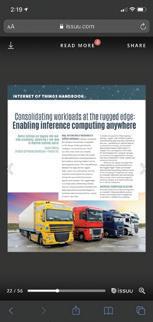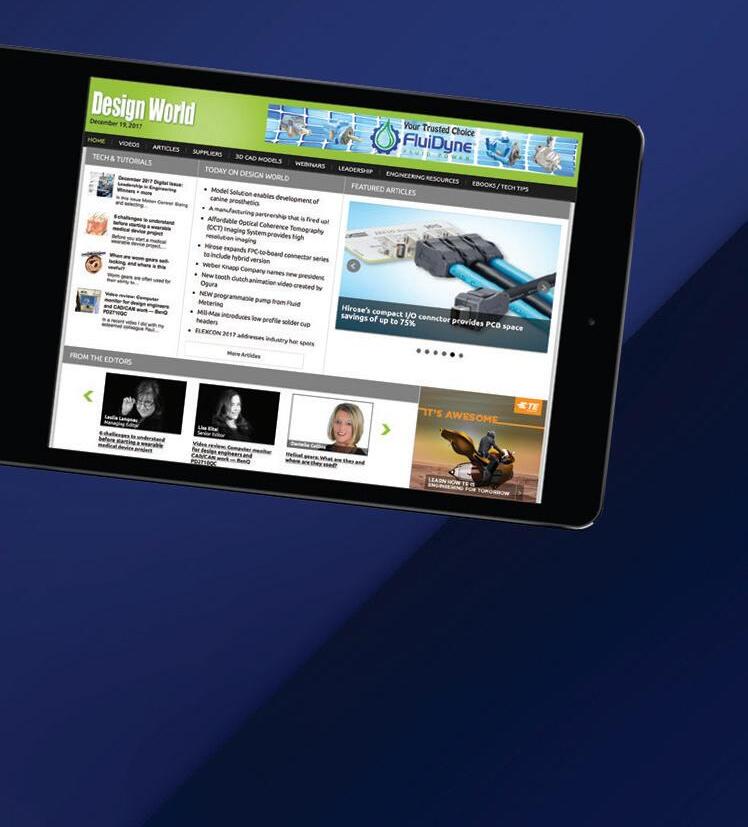April
2023











April
2023
















SiTime Corp. has announced two new Endura precision timing oscillator families. These ruggedized devices are engineered to deliver high performance in extreme conditions in aerospacedefense applications such as Positioning, Navigation and Timing (PNT), tactical communications, network synchronization, and surveillance. The devices include the Endura ultra-stable SuperTCXO and the Endura low-jitter di erential oscillator. Both families deliver 10x better environmental resilience. In addition, the Endura Super-TCXO family delivers up to 5x better stability, while the di erential oscillator family delivers the best jitter.
“Timing technology is ever more crucial in aerospace and defense applications where extreme conditions are the norm,” said Fari Assaderaghi, EVP, Technology and Engineering, SiTime. “Today, in these systems, timing is a major source of performance challenges during system verification, qualification, and field operation. This leads to significant engineering time spent in troubleshooting and/or negotiating waivers with end customers. With the drive to higher performance and positioning accuracy, timing requirements for new aerospace-defense electronics are only getting more stringent. It is di cult to foresee how legacy timing devices will continue to perform well in these new systems.”


“SiTime Endura precision timing solutions deliver a dramatically better user experience,” explained Assaderaghi. “Not only can designers count on the performance and reliability of Endura-based timing systems, but they can also save valuable development time that would have otherwise been spent in troubleshooting. The SiTime Endura family is fast becoming the preferred timing choice for aerospace and defense engineers.”
SiTime’s innovative MEMS, analog and systems technologies enable many features that simplify design. For example, frequencies are programmable — up to 6 decimal places of accuracy — and ensure that the designer can select the exact frequency they want, to enhance system performance. With a frequency stability specification as low as ±10 ppb, designers can replace unreliable, power-hungry, large OCXOs with easy-to-use Super-TCXOs. With a power-supply noise rejection (PSNR) specification, SiTime devices are very resistant to power supply noise, which is a common problem in the dense electrical environments of aerospace-defense electronics.
The device o ers advanced specifications as below:
• 1 to 60MHz
• -40° C to 105° C operating temperature range, enables use in extreme temperatures
• ±10 ppb frequency stability over the full temperature range, highest amongst TCXOs, and able to replace more expensive, power-hungry, and less-reliable OCXOs


































































• Industry-leading 0.01 ppb/g g-sensitivity per MIL-PRF-55310
• 110 mW (typ.) power consumption, 2 to 10 times lower than ±10 ppb


OCXOs


• ±0.5 ppb/°C dF/dT (frequency slope), resistant to thermal shock and airflow
• ±300 ppb 20-year aging at 85° C, eliminates expensive in-factory calibration that is required with less stable devices
• Small 7.0 mm x 5.0 mm ceramic package, insensitive to board bending stress, reducing board layout constraints
Endura differential oscillators enable low data error rates and uninterrupted communications for on-the-ground, mounted, dismounted and airborne conditions.
• SiT9551, 15 different frequencies from 25 to 644.5 MHz, 70 fs RMS typical IPJ (integrated phase jitter, 12 kHz to 20 MHz integration range)
• SiT9346, 1 to 220 MHz frequency range, 150 fs RMS typical IPJ
• SiT9347, 220 to 920 MHz frequency range, 150 fs RMS typical IPJ
• 9 fs/mV power supply noise rejection (PSNR) ensures peak performance in the presence of power-supply noise, which is a common issue in dense aerospace-defense electronics
• -55° C to 125° C operating temperature range, enables use in extreme temperatures





• 0.04 ppb/g g-sensitivity per MILPRF-55310



• ±20 to ±50 ppm frequency stability over the full temperature range
• 26 mA no load current (typ.) with LVDS, 1.8V, 2.5V or 3.3V supply voltage
• Available in 2016, 2520 and 3225
QFN packages

Availability
Both device families are sampling now. Volume production for Endura SiT5541 ultra-stable Super-TCXO is expected in March 2023, and for Endura SiT9551 low-jitter differential oscillators in July 2023. Upon release, all Endura precision timing solutions will be available on SiTimeDirect for quick configuration and 48-hour shipments. AD
SiTime Corp. | sitime.com






Model-based systems engineering (MBSE) is broadly defined as the structured use of digital modeling to support system features, requirements, design, verification, and validation extending from the conceptual design phase and continuing until end of life. The concept of systems engineering is deeply engrained in the military and aerospace communities. MBSE represents a shift from highly developed linear and document-centric processes to a collaborative and non-linear, digital information-based approach. The traditional system engineering approach has proven unsuited to new generations of complex, cyber-physical systems.

Before the introduction of MBSE, the DoD used a robust, highly (paper) documented linear system to design, verify, test, and acquire complex systems. This approach consisted of siloed engineering teams with limited direct interaction and little or no real-time exchange of data. It has been illustrated with a V-shaped diagram that pictures the linear steps used by traditional systems engineering approaches, Fig. 1. It moves from the top left to the bottom of the V with activities related to the decomposition of mission requirements and the various steps in the design process. Moving from the bottom and up the right side of the V involves testing, verification, validation, production, and in-the-field operation of the system until the end of its life.
The V illustrates an inherently sequential process with limited accommodation for iterative activities. With the emergence of complex and interrelated cyber-physical systems and systems of systems, these inherently linear systems engineering methodologies have become unusable.




Fig. 2. This diamond illustrates the overlay of digital twins on the traditional V process and the collaborative and iterative nature of MBSE as supported by the digital thread. | Boeing
No more paper documents
MBSE replaces inflexible, costly, and slow paper documentation of the system engineering process with digital communication based on digital twins and digital threads. A digital twin is a real-time virtual model of a system that spans the entire system lifecycle from initial conceptualization to decommissioning. It has sufficient detail to support performance simulations, virtual verification, validation testing, system integration, monitoring, and maintenance.
The digital thread supports use of the digital twin. A digital thread contains all the information about the initial

development of the digital twin and all modifications made throughout the system’s operating life. The digital thread is constantly updated and becomes the single source of ‘truth’ about the design process and the status of the digital twin and can be accessed by all design teams. It can also include operational, maintenance, and other information related to systems in the field. For example, in the case of complex systems such as aircraft and ships, there’s a unique digital thread for each platform in the field. The concepts and methodologies of MBSE do not fit easily into the systems engineering V diagram.

The Boeing diamond
To replace the linear thinking associated with the ‘V,’ the DoD encourages suppliers to adopt MBSE to arrive at a faster and more agile system development process. Stacks of paper documents are being replaced with digital twins and digital threads. For its part, Boeing has developed the “Boeing diamond” as a new way to envision the systems engineering process and depict the addition of real-time modeling, simulation, and collaboration to the traditional ‘V,’ Fig. 2. The bottom portion includes activities related to the physical system and closely resembles the previous ‘V’ diagram. The top portion includes activities related to the digital twin of the physical system and includes detailed and real-time modeling and simulation. In between is the digital thread that is available to all design teams, including mechanical, electric, electronic, software, and so on, and provides real-time feedback throughout the design, delivery, and deployment of the system.
The DoD and MBSE
In addition to working with suppliers like Boeing, the Department of Defense (DoD) has a strong interest in MBSE for internal use. The DoD looks at the system models as an integrated representation of all aspects of the system architecture and design, including:
• Requirements — anticipated mission operations, stakeholder goals, purposes, and definition of success for the system
• Behaviors — needed transformations of system inputs to create the required responses to the external environment
• Structure — operational sections of the system that produce the behaviors




















These

• Parameters — detail the performance requirements, physical characteristics, and operational rules that constrain and define the structure and behaviors

From the DoD perspective, an MBSE project is built on a foundation of three elements; the programming language, the tools, and approach that combine to produce the system model or digital twin, Fig. 3. In this view, the system model is the single source of truth and contains all current information about the system. It should be unified, consistent, coherent, and structured to provide the various engineering teams with relevant data in an accessible format to enable efficient completion of the system design.
The Systems Modeling Language (SysML) is the primary MBSE modeling language but not the only language. At various stages of the system lifecycle, other languages are used to provide specific functionality. For example, the Object Management Group’s (OMG) Modeling and Analysis of Real Time and Embedded systems (MARTE) language can be combined with the Unified Modeling Language. There’s also Modelica, an object-oriented, multidomain modeling language for systems containing mechanical, electrical, electronic, hydraulic, thermal, control, electric power, and/or processoriented elements.
MBSE uses various tools to describe, analyze, and manage the system over the design lifecycle. These modeling tools provide the various engineering disciplines with access to the application programs and support design analysis activities. The tools can also support collaboration and the ability to manage system changes, enabling multiple individuals and multiple teams to work on the system simultaneously.

The approach is a detailed set of design tasks, identifying what needs to be accomplished, what the team is responsible for, and when it should be completed. It can include specific design review milestones, responsibility for model maintenance, identification



LEMO connectors provide solutions that are compact, lightweight, rugged, and shock/vibration resistant, ideal for civil aircraft, commercial aviation industry, military aviation, launch vehicles, satellites and space stations.


Leighton Lee II was an innovator. He founded our company on that spirit, built our success by solving customer problems, and developed a full product line of flight-critical microhydraulic components for the aerospace industry. It all started with the Lee Plug®, which has ensured leak-tight sealing in aircraft and spacecraft hydraulic systems for decades. Since then, our product portfolio has continually expanded with innovations like our easy-to-install and steadfastly reliable Quick Installation Plug. We identified the need, and Lee engineers created the solution. That approach has made us uniquely qualified in aerospace. We know what can go wrong in an aircraft—and the steep price you’ll pay if a plug fails— so we manufacture, inspect, and test to prevent that from happening. Don’t risk letting an imitator ruin your day—or your design. Contact us today to put our knowledge to work for you.

Learn more at theleeco.com/aerospace
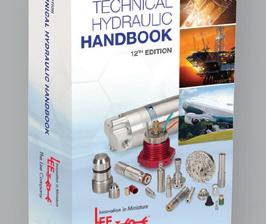


Extreme temperatures, dielectric strength, adhesion, durability, or most critically flame retardant


Adhesive Tape Solutions:
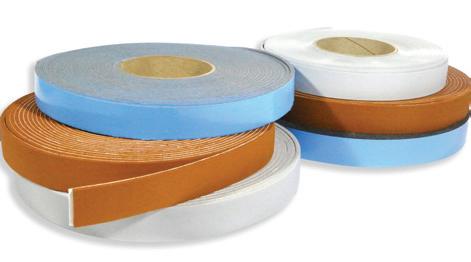








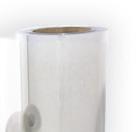

• Masking aircraft parts from harsh elements and environmental conditions



• Mounting and bonding solutions for cabin assembly
• High temperature tapes for cable and wire wrapping
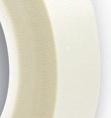


Polymer Film Solutions:

• Barrier Films for protection against UV and environmental conditions

• Optically clear films for alternative windows and module lenses


• Specialty die cut film parts for seals, gaskets, and or gap filling applications







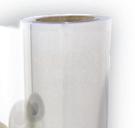

Silicone Rubber Solutions




• Solid, Sponge, & Foam silicone rubber sheeting. Multiple grades durometers & thicknesses.

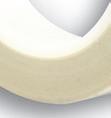




• Tight tolerance die cut parts, gaskets, slit rolls, or sheeted materials


• Strip n’ Stick Gasket Tape
800-461-4161
of required tools, simulation requirements, and acceptance testing for the final system. The architecture framework is a key element driven by the approach’s intersection and the modeling/development languages. Finally, orchestration is needed to build and manage the digital thread and ensure that information is exchanged between di erent modeling tools, and engineering groups, in a relevant and e cient manner.
NASA is another fan
The systems engineering (SE) technical discipline team (TDT) at NASA has explored several options for improving SE’s ability to develop and deploy increasingly complex missions and to do it quicker and at a lower cost. The use of MBSE at NASA started in 2016, and metrics were captured and analyzed on improvement, model reuse, and the ability to integrate and evaluate complex systems. As a result, NASA has established an agency-level, cross-center MBSE
Community of Practice and access to a technical peer review team comprising senior SEs and MBSE tooling experts.

The TDT has worked with the O ce of the Chief Engineer (OCE) to develop the tools and resources needed to move toward an enterprise cloud MBSE solution. The OCE has provided access to enterprise-level MBSE software licenses and cloud-based resources for storing and integrating MBSE models. To encourage and facilitate the use of MBSE, the OCE’s Academy of Program/ Project and Engineering Leadership (APPEL) has deployed a three-course series on MBSE addressing foundations, applications, and MBSE design and analysis.
In addition to developing immediate applications for MBSE, the TDT is working within the agency and with external partners to develop a strategic vision to help reduce MBSE adoption risk. In addition to working on a strategic vision, a competition is being implemented through the NASA Tournament Lab, providing digital models of NASA exploration elements. These models were developed external to the agency and will be used to compare tools, techniques, templates, and approaches from a broader, more diverse community and can potentially be utilized to populate a starter library of digital exploration element models. Finally, NASA has established a council of senior technical personnel to develop a 20-year long-term vision and road map for NASA’s MBSE capability and how it might be expected to evolve and bring increasing value. AD
3. The system model, or digital twin, can be supported using a combination of descriptive languages and tools combined with the development approach.


Siemens Digital Industries Software has announced that Swedish electric airplane maker Heart Aerospace has selected the Capital software portfolio from the Siemens Xcelerator portfolio of software and services to support its design, development, and certification of zero emission electric aircraft. Siemens’ Capital will provide electrical and electronic (E/E) system design and support as Heart Aerospace addresses the market and regulatory demands of escalating performance and commercial certification requirements.

As part of the extensive electrification in these aircraft, Heart Aerospace must address the complexity of the Electrical Wiring Interconnect System (EWIS) — while also addressing electrical system compliance risk. The Capital tool’s strong compliance functionality can help Heart Aerospace to leverage automation and digital data continuity to facilitate faster regulatory compliance.
“Heart Aerospace’s adoption of Capital from the Siemens Xcelerator portfolio gives them the advantage inherent in digitalized E/E system development out of the starting gate,” said Anthony Nicoli, Senior Director for Aerospace & Defense, Siemens Digital Industries Software. “To successfully compete for air transport routes, eAircraft must achieve demanding performance goals using fully certified, power and weight optimized E/E systems. Siemens is excited to help Heart Aerospace accelerate aircraft design to meet both performance and certification requirements.”
“As a young company with a new project, Heart Aerospace decided to adopt Capital software, which was the only tool we evaluated that supports creation of electrical and avionic system deliverables and seamlessly flows them downstream into the physical products of the EWIS for each development phase,” said John Rader, Section Lead Electrical Wiring Interconnect System Engineer, Heart Aerospace. “The improvement in workflow, especially when considering that configuration management within Capital is both strong and intuitive, allows focus on the engineering and not the tool. With sophisticated additional analysis models such as voltage drop calculation and the great support available, Heart Aerospace is confident we made the best choice.”









In the aerospace industry, optimal fit, finish and function of critical metal parts is not an advantage. It’s crucial, to ensure performance and demanding cycle life specifications. That’s why aerospace engineers often specify electropolishing for finishing of critical metal parts.
With its ability to remove a microscopically precise layer of surface material and remove microburrs, microcracks and contaminants left behind by machining processes, electropolishing creates a defect-free finish with significantly improved corrosion resistance and cycle life. Electropolishing leaves metal parts free of surface imperfections that become initiation points for corrosion and part failure.
Download our whitepaper to learn more, or schedule a private lunch and learn session for an opportunity to explore what electropolishing can do for your critical metal parts.


Boker’s provides custom stamped component parts to accommodate nearly any aerospace and defense application, including avionics, control systems, engines, hydraulic, pneumatic and other equipment that require unique specifications. Boker’s Quality Management System is certified to the stringent AS 9100:2016/ISO 9001:2015 standard, and can comply with DFARS and RoHS, with the ability to manufacture to customer provided AN, NAS, MS and MIL spec standards.

At Boker’s, we know that aerospace and defense OEMs demand manufacturing partnerships with the highest levels of precision, quality management and performance, along with a strong understanding of unique industry requirements ranging from space/ non-space qualifications to AMS specifications. For over 100 years, Boker’s continues to meet the evolving design needs of the aerospace, aviation and defense industries.








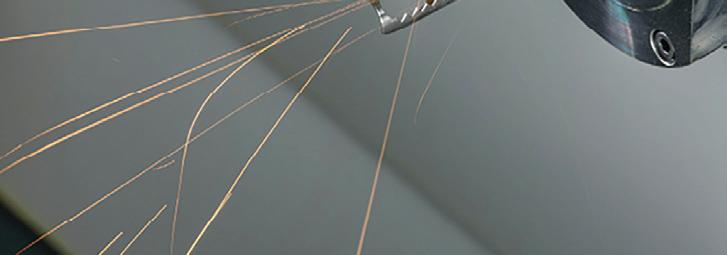
Combining conventional Swiss machining with laser processing is a cost-e ective alternative to multioperational manufacturing. This single machine platform allows Cadence to perform several processes in just one step which reduces part handling and improves its precision.


This game changing technology combines CNC machining, laser cutting, laser drilling, laser marking, and laser welding. Additional benefits include rapid prototyping, higher quality, and significant cost savings. LaserSwiss machining provides endless possibilities for new product development!

D-Wrap tape is a 1mil blue, high-temperature, high tensile polyester film coated with a fully cured silicone adhesive. There is no contamination problem from the silicone adhesive because it is fully cured and does not transfer. D-Wrap also has more adhesive than typical polyester tapes and has superior adhesion and better conformability.
This tape is designed to provide clean removal during masking operations that involve high temperature and pressure. D-Wrap retains flexibility and thermal resistance as well as abrasion and chemical resistance. This helps to reduce failures due to cracking and backing deterioration. The silicone adhesive provides for higher heat resistance than many other adhesives and helps to reduce failure due to softening, oozing and adhesive transfer.

sales@cadenceinc.com
www.cadenceinc.com

Tel: 540-248-2200

Fax: 540-248-4400


When you need to align, hold, or latch di erent parts of equipment together, you need a spring-loaded device. These locking systems are designed to facilitate repetitive positioning operations on machines and equipment or parts undergoing machining. Spring-loaded devices create a secure connection with limited play. JW Winco has many di erent versions and types for your application requirement.

Check out www.jwwinco.com to find out more!

Extending the capabilities of its field-proven M Series, LEMO has released the new M Series HY, a new model specifically designed for applications requiring vacuum-tight connections in harsh environments. Ultra-low leak rate coupled with a wide operating temperature range allows for unmatched performance in optical enclosures or high-altitude applications.
The M Series Vacuum-Tight provides customers with the highest density ratchet coupling connectors on the market where vacuum-tight integrations are required. This connector o ers reliable, safe, rugged, and lightweight interconnect solutions for aerospace, automotive, defense, tactical communication, and Unmanned Aerial Vehicle (UAV) applications.
Key features:
• Ultra-low leak rates.
• Optimized PCB tails enabling easier PCB routings on high-density configurations.
• Vacuum-tight sealing over an extended temperature range -55° to +150° C.









• High vibration resistance.

Unmanned vehicles require reliable components and, above all, energye cient drives that ensure the longest possible uptime. maxon DC motors meet these requirements without di culty. Unmanned aerial vehicles enable dangerous missions, such as flying in disaster areas. maxon engineers transfer their knowledge from custom projects to other projects, whether actuators in passenger planes or stabilizers in unmanned aircraft.
• Observation: Inspection, agriculture, mapping and delivery drones.

• Payload mechanisms: control surface actuators, electro-optics, gimbal and load drives, winch and load mechanisms.
• Drive systems consisting of an optimized combination of motor, controller and propeller for multirotor, fixed-wing and VTOL aircraft.
maxon’s new UAV propulsion drive system is safe, e cient and ready for take-o .
maxon actively supports UAV manufacturers with their ambitious designs, up to certification. Our UAV product portfolio o ers matched combinations of motors, ESCs and propellers, for optimized propulsion systems providing maximum e ciency and reliability. Hence, operational safety and flight time are maximized, and costs of ownership dramatically cut down. maxon is continuously enhancing its portfolio to o er customers an extensive range of solutions. Reach out to us to get your ideas o the ground!
Visit uav.maxongroup.com for more maxon solutions.








NEWT is committed to being the premier manufacturer of choice for customers requiring specialty wire, cable and extruded tubing to meet existing and emerging worldwide markets. Our custom products and solutions are not only engineered to the exacting specifications of our customers, but designed to perform under the harsh conditions of today’s advanced manufacturing processes. Cables we specialize in are LITZ, multi-conductor cables, hybrid configurations, coaxial, twin axial, miniature and micro-miniature coaxial cables, ultra flexible, high flex life, low/high temperature cables, braids, and a variety of proprietary cable designs. Contact us today and let us help you dream beyond today’s technology and achieve the impossible.


maxon precision motors, inc.


125 Dever Drive Taunton, MA 02780


Phone: 508-677-0520
info.us@maxongroup.com
www.maxongroup.us
Contact info: New England Wire Technologies www.newenglandwire.com 603.838.6624



The Lee Company’s new Latching Solenoid Valve is the ideal solution for power sensitive applications. By incorporating permanent magnets into the coil design, this miniature solenoid valve o ers a dramatic reduction in overall power consumption, particularly when operating with extended “ON” periods. Unlike traditional designs that require continuous voltage to energize the valve from its natural state, this latching solenoid requires only a momentary pulse of less than a Joule to switch to and remain in state.
Available in both 2-way and 3-way configurations, this 2 position latching solenoid valve features The Lee Company’s unique and patented MultiSeal® technology which radically simplifies port layout, o ers significant space savings, reduces machining costs and provides superior reliability over traditional sealing methods.
It’s not a web page, it’s an industry information site.








So much happens between issues of R&D World that even another issue would not be enough to keep up. That’s why it makes sense to visit rdworldonline.com and stay on Twitter, Facebook and Linkedin. It’s updated regularly with relevant technical information and other significant news for the design engineering community.


